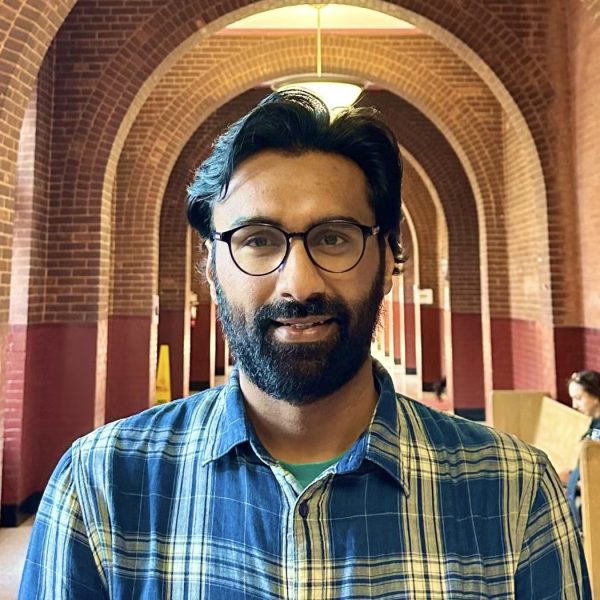Federal immigration agents detained a Georgetown University postdoctoral fellow March 17, seeking to deport him and accusing him of opposing U.S. foreign policy.
The researcher, Badar Khan Suri of the Georgetown School of Foreign Service’s Prince Alwaleed Bin Talal Center for Muslim-Christian Understanding (ACMCU), is an Indian citizen residing legally in the United States on a visa for researchers. His arrest comes amid a broader crackdown by the administration of President Donald Trump on individuals involved in or with links to pro-Palestinian activism; Khan Suri’s wife, a U.S. citizen and Georgetown graduate student, is Palestinian.
According to a petition his lawyer filed in federal court that Politico obtained, federal agents arrested Khan Suri outside his home in Rosslyn, Va., telling him his visa had been revoked and that he would be arrested. The petition alleges immigration agents detained Khan Suri because of connections between his wife and the Palestinian militant group Hamas.

As of March 19, Khan Suri was detained at an immigration facility in Alexandria, La., according to a locator for immigration detainees. Politico first reported on Khan Suri’s detainment.
Khan Suri holds a J-1 visa for non-immigrant researchers. A university spokesperson told The Hoya Khan Suri is residing in the United States legally.
“Dr. Khan Suri is an Indian national who was duly granted a visa to enter the United States to continue his doctoral research on peacebuilding in Iraq and Afghanistan. We are not aware of him engaging in any illegal activity, and we have not received a reason for his detention,” the spokesperson wrote. “We support our community members’ rights to free and open inquiry, deliberation and debate, even if the underlying ideas may be difficult, controversial or objectionable. We expect the legal system to adjudicate this case fairly.”
Tricia McLaughlin, the Department of Homeland Security’s assistant secretary for public affairs, said in a statement that Khan Suri was arrested under a U.S. law that allows deportation of noncitizens whom “the Secretary of State has reasonable ground to believe would have potentially serious adverse foreign policy consequences for the United States.”
“Suri was a foreign exchange student at Georgetown University actively spreading Hamas propaganda and promoting antisemitism on social media,” McLaughlin wrote. “Suri has close connections to a known or suspected terrorist, who is a senior advisor to Hamas.”
DHS has yet to provide evidence to support this claim. Khan Suri has not been charged with a crime, according to his lawyer.
Khan Suri’s wife, Mapheze Saleh (GRD ’26), is a first-year graduate student in the School of Foreign Service’s (SFS) Center for Contemporary Arab Studies. Saleh’s father, Ahmed Yousef, served as an official in Gaza’s Hamas-run government before leaving his position over ten years ago. Yousef publicly criticized Hamas’ Oct. 7, 2023, attack on Israel, according to The New York Times, and told the Times that Khan Suri is not involved in any “political activism” for Hamas.
Right-wing news outlets, including the National Review, have targeted Saleh in recent weeks for her alleged ties to Hamas and her social media activity in the aftermath of the Oct. 7, 2023 terrorist attacks. The criticism has been amplified on social media by the Embassy of Israel in the U.S.
Khan Suri’s arrest comes nine days after the March 8 detainment of Mahmoud Khalil, a student activist at Columbia University who led protests against the Israel-Hamas war. Khalil’s detention — under the same law governing Khan Suri’s arrest — spurred nationwide protests, including at Georgetown, arguing his arrest violates free speech rights.
At Georgetown, Khan Suri studies religion, violence and peace, focusing on the Middle East and South Asia, according to his faculty profile. He is currently teaching a class on majoritarianism and minority rights in South Asia and researching peacebuilding in Iraq and Afghanistan.
In an email sent to SFS faculty members obtained by The Hoya, SFS Dean Joel Hellman said Khan Suri has not posed a danger to the Georgetown community and reaffirmed the university’s commitment to free speech.
“During his time on campus, I am not aware that Badar has engaged in any illegal activity, nor has he posed a threat to the security of our campus,” Hellman wrote in the email. “He has been focused on completing his research.”
“Like many in our community, Badar has been exercising his constitutionally protected rights to express his views on the war in the Middle East,” Hellman added. “Georgetown has consistently protected such freedoms within the context of our longstanding Speech and Expression Policy.”
Khan Suri’s lawyer, Hassan Ahmad, did not respond to immediate request for comment.
This article has been updated to reflect recent developments.
Ari Citrin contributed to reporting.